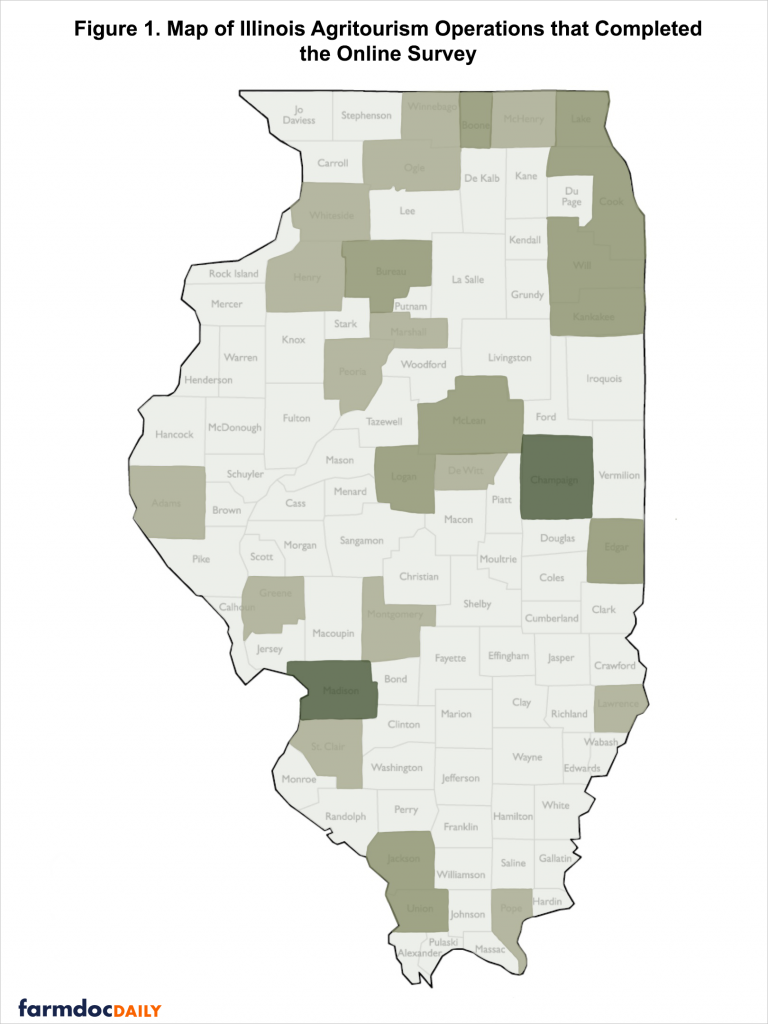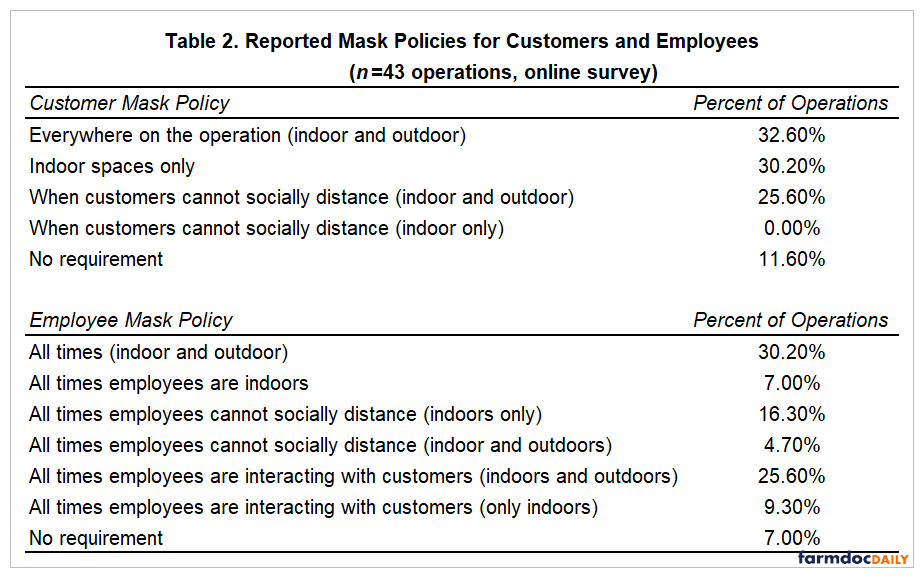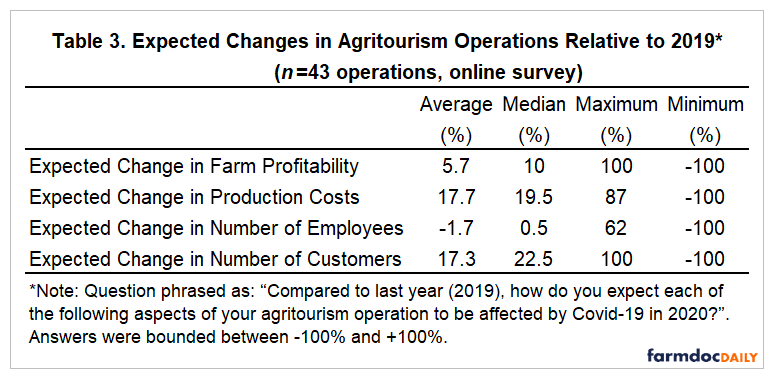Pumpkin Patches during the Pandemic: How Agritourism Operations in Illinois are Coping with Covid-19
This year agritourism looks more different than ever before. Apple picking in a mask. Pumpkin patches with one-way signs. Pick up produce boxes instead of browsing at the farmers’ market. Socially distanced wine tastings. All across the state, Illinois agritourism operations have worked to make adjustments to their businesses to comply with public health guidelines and regulations to ensure they can keep their business open while also keeping their employees and customers safe. In this post, we explore how these operations are coping during Covid-19. More specifically, we conducted a survey of regional agritourism operations and reviewed websites for agritourism operations in Illinois to better understand what policies have been implemented and the financial impact of the pandemic on local agritourism.
Background: The State of Agritourism in the U.S.
Agritourism is one of the fastest growing sectors of rural tourism. Between 2002 and 2017, agritourism revenue more than tripled in the United States, totaling $905 million when adjusted for inflation and exclusive of winery revenue (Whitt et al., 2019). Benefits from agritourism can extend beyond the farm and provide some stimulus to local economies (Whitt et al., 2019). Representing a hybrid model of agricultural production and tourism, it provides “a number of financial, educational, and social benefits to tourists, producers, and communities . . . [and] enhances the tourism industry by increasing the volume of visitors to an area and the length of their stay” (The National Agricultural Law Center, 2020). Some entrepreneurial farmers have even started online agritourism enterprises designed to educate and entertain the public, while generating supplemental income via advertising revenue from social media platforms like YouTube (Barry, 2020).
Agritourism encompasses a wide range of activities. In general terms, it is “an enterprise at a working farm, ranch or agricultural plant conducted for the enjoyment of visitors that generates income for the owner” (Whitt et al., 2019). Enjoyment includes opening agricultural areas for the purpose of recreation, education, or active engagement in the productive activities of the farm or operation (The National Agricultural Law Center, 2020). The following activities are found in varying combinations among a range of definitions of agritourism (Barry, 2020):
- Outdoor recreation (fishing, hunting, wildlife study, horseback riding);
- Educational experiences (cannery tours, cooking classes, wine tasting);
- Entertainment (harvest festivals or barn dances);
- Hospitality services (farm stays, guided tours, outfitter service);
- On-farm direct sales (U-pick operations, roadside stands).
In the state of Illinois, “agritourism is defined as any business that brings the public to a farm or rural setting in an effort to market farm raised or produced products or the enjoyment of related outdoor activities” (University of Illinois Extension, 2020). Common types of agritourism operations in the state are pumpkin patches, apple orchards, berry farms, and wineries.
Data Collection
To examine how Illinois agritourism operations are responding during the Covid-19 pandemic, we collected data from two sources.
First, we distributed an online survey directly to Illinois agritourism operations. We worked with the Illinois Farm Bureau and Illinois Specialty Growers Association to distribute the survey. We also emailed agritourism operations listed in the University of Illinois Extension agritourism directory. The purpose of the survey was to ask agritourism operations about the adjustments they were making in response to Covid-19 as well as how they expected the changes would ultimately impact their bottom line for the year.
Second, we collected data from agritourism operations’ websites to document what, if any, information related to Covid-19 was being communicated on these websites. We coded for three items: first, if any Covid-19 policies were mentioned on the site (for example, if masks should be worn or if pre-registration was required); second, if they had closed due to Covid-19; and third, if they had a Covid-19 liability statement. Liability statements indicated that by coming to the operation, customers understood they were accepting the increased risk of Covid-19 from going to a public place. We generated a list of agritourism operations using the University of Illinois Extension directory of agritourism operations in the state. There were 211 operations, not including operations that had closed permanently before the Covid-19 pandemic. Operations that did not have a website or operations that only had a Facebook page were excluded from the analysis. In total, we retained 176 websites for analysis. Websites were analyzed on October 15, 2020. As websites are dynamic and change frequently, we cannot speak to changes that may have been made before or after this date.
Results
In total, we received 43 complete survey responses from operations in 27 counties (see Figure 1). Operations grew a variety of agricultural products, but over half (55.8%) produced pumpkins (see Table 1). Many operations sold multiple types of products; the average operation sold into 2.6 agricultural product categories). Operations were quite varied in size (less than 1 acre to 1,200 acres). The average operation was 65.8 acres and the median was 15 acres. More than half of the operations (62.8%) have been engaged in agritourism for over 10 years. About half (53.5%) had 1-5 full and part-time employees, 23.3% had 6-10 employees, and 23.3% had 10 or more employees.
Reported Closures and Operating Policies
Some agritourism operations responded to Covid-19 by temporary or year/season closures. Our survey analysis indicated that 23.3% of operations had experienced some type of closure; 16.3% of operations closed temporarily and 7.0% of operations closed for their season/year. Our website analysis indicated that 2.3% of operations closed for the full year/season. The difference here may be due either to closed operations not updating their websites or to closed operations being more inclined to participate in the survey. Of those who reported closing temporarily (in the online survey), the most common months to be closed were March, April, and May – at the start of the pandemic.
Many agritourism operations enacted Covid-19 policies at their businesses. Nearly half (47.7%) of the agritourism operation websites we analyzed had specific Covid-19 policies listed on their website. In the online survey, the vast majority of operations reported having mask policies for customers and employees (88.4% and 93.0% had customer and employee mask policies, respectively). Table 2 shows that the most common customer mask policy was to require masks everywhere on their operation, both indoor and outdoor (32.6% of operations). Per the Illinois state mask mandate, “Any individual who is over age two and able to medically tolerate a face-covering (a mask or cloth face-covering) shall be required to cover their nose and mouth with a face-covering when in a public place and unable to maintain a six-foot social distance. Face-coverings are required in public indoor spaces such as stores.” (Executive Order 2020-32). Asking customers to wear masks at all times, even when socially distancing may be possible, may be a way that farms are reducing the need to enforce rules. Enforcement seems to be a sticking point for many. Almost all operations (90.3%) indicated they were concerned about enforcing rules on their operation, and only 60.5% of operations said their employees would be asked to enforce their mask policy. Some operations that are trying to enforce mask policies noted that enforcement had been difficult and required additional hiring.
For employees, 30.2% of operations required employees to wear masks at all times, both indoors and outdoors (see Table 2). Some operations (53.5%) have also developed or plan to develop an employee health policy. Ohio State University Extension (2020) suggested regularly monitoring temperature and providing paid sick time to employees. The Institute for Food Safety at Cornell University (2020) has created tools for operators to streamline decisions including: when to have an employee be tested for Covid-19 and an employee health screening sheet.
Additional policies most Illinois operations implemented were increased cleaning and sanitizing and posting signs with Covid-19 information (see Figure 2). Some operations pivoted and sold in new ways (for example, 55.8% reported selling produce boxes this year). Few operations required tickets or pre-registration, and even fewer required customers to sign liability waivers or purchased additional liability insurance. Our survey results reveal that only 4.7% of operations required liability waivers from their customers. When we analyzed agritourism operations’ websites, we found that a slightly higher proportion, 6.3%, listed a specific Covid-19 liability statement on their website. The operations with a liability statement on their website were all U-Pick operations.
Most operations that had playgrounds, live music, or hayrides in 2019 chose to limit or close them this year due to Covid-19. This may be due to state or city regulations that limit these activities. For example, the Illinois operation guide suggested farms should have wagon rides meet public transit Covid-19 restrictions (Illinois Farm Bureau, 2020). Most operations with corn mazes, U-Pick operations, or retail/grocery in 2019 chose to keep those components open during the pandemic. The decision to close or limit petting zoos and pony rides was mixed.
Expected Changes in Profitability
The expected financial impact of Covid-19 ranged widely across agritourism operations. Survey respondents expected an increase in profitability compared to 2019 – 5.7%, on average (see Table 3). This is despite an expected increase in production costs of 17.7%, on average. Some operations are doing better than usual, as they have significantly increased demand. This follows the national trend of customers looking for safe outdoor activities during the pandemic (Outdoor Industry Association, 2020). On average, operations reported an expected 17.3% increase in the number of customers relative to 2019. Agritourism operations that are highly-dependent on hosting large events (e.g., weddings, school visits) are not faring so well, however. Those that host such events reported that over 80% of events for this year have been canceled.
While profitability was expected to increase, on average, the majority of agritourism operations surveyed were still concerned about profitability or breaking even; 41.9% of operations surveyed were very concerned, 27.9% were somewhat concerned, and 30.2% were not concerned. Some operations (44.2%) have sought out and received state or federal Covid-19 relief funding to support their businesses.
Concluding Thoughts
Covid-19 has presented both challenges and opportunities for agritourism operations in Illinois. Many agritourism businesses have been forced to make adjustments to their operating policies and procedures, which are expected to increase production costs, yet many operations expect higher profits than 2019, driven by an increased demand for safe, socially-distant outdoor activities. Operations that are reliant on large events like weddings may continue to struggle as the state of Illinois is currently implementing Covid-19 mitigation efforts in many regions which places further restrictions on large gatherings.
References
Barry, Ellen. 2020. In a Wistful Age, Farmers Find a New Angle: Chore TV. The New York Times, August 7, https://www.nytimes.com/2020/08/07/us/farmer-influencer-youtube.html.
Illinois Farm Bureau. 2020. COVID-19 Resources: Local Foods and Specialty Crops. https://www.ilfb.org/resources/covid-19-resources/local-foods-and-specialty-crops/.
Institute for Food Safety at Cornell University. 2020. Cornell Developed Templates & Trainings. https://instituteforfoodsafety.cornell.edu/coronavirus-covid-19/food-industry-resources/food-facility-strategy-checklist/.
Ohio State University Extension. 2020. COVID-19 Food Safety for Specialty Crop Farm Operators. https://static1.squarespace.com/static/5b92fe3ee17ba3e74c569906/t/5e85ed9cb262b710f240db6b/1585835421183/Ohio_Food_Safety-SC_Operations.pdf.
Outdoor Industry Association. 2020. Increase in Outdoor Activities due to COVID-19. https://outdoorindustry.org/article/increase-outdoor-activities-due-covid-19/#:~:text=Data%20Confirms%20Increase%20in%20Outdoor%20Activities%20Due%20to%20COVID%2D19.&text=Americans%20have%20flocked%20to%20outdoor,were%20running%2C%20cycling%20and%20hiking.
The National Agricultural Law Center. 2020. Agritourism – An Overview. https://nationalaglawcenter.org/overview/agritourism/#:~:text=Importance%20of%20Agritourism&text=Agritourism%20also%20provides%20communities%20with,states%20to%20develop%20business%20enterprises.
University of Illinois Extension. 2020. Illinois Agritourism. https://web.extension.illinois.edu/agritourism/.
Whitt, Christine, Sarah A. Low, and Anders Van Sandt. 2019. Agritourism Allows Farms to Diversify and Has Potential Benefits for Rural Communities. Amber Waves, https://www.ers.usda.gov/amber-waves/2019/november/agritourism-allows-farms-to-diversify-and-has-potential-benefits-for-rural-communities/.
Disclaimer: We request all readers, electronic media and others follow our citation guidelines when re-posting articles from farmdoc daily. Guidelines are available here. The farmdoc daily website falls under University of Illinois copyright and intellectual property rights. For a detailed statement, please see the University of Illinois Copyright Information and Policies here.












